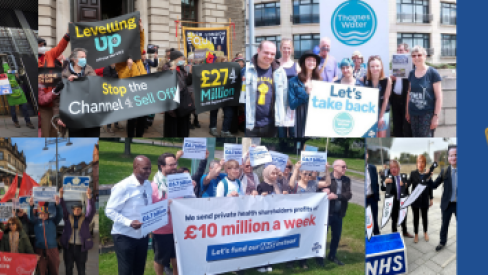
17 January 2018
Corbyn is right - this is a ‘watershed moment’ for the ideology of privatisation that has plagued our public services for over 30 years.
Here are seven steps we can take to address the root causes of the Carillion crisis – and build up a robust public sector that won’t be vulnerable to this kind of disaster.
Let’s futureproof our public services by bringing them into public ownership. Here’s how.
Of course the government should bring all of Carillion’s public service contracts in house, permanently, where they should be – across schools, hospitals, prisons and railways. It should also stop outsourcing altogether.
We’ve been arguing against outsourcing since our launch in 2013. Our #PrivatisationFails resource shows that these profit-driven companies have failed us again and again. G4S at the Olympics. Atos failing disabled people. Richard Branson suing the NHS.
This is not a coincidence. Public services are mostly about caring for people. Private companies are driven by profit. This means corners are cut so that shareholders get their share.
The Institute for Economic Affairs says government can’t run things. It’s time to put that tired old mantra to bed. Research shows that councils can save money, improve quality and increase flexibility by bringing services in house.
Private companies are good at doing many things. Running public services isn’t one of them.
As People vs PFI have powerfully shown, Private Finance Initiatives are institutionalised systems for the theft of public money meant for public services. The collapse of Carillion gives us a chance to end this discredited policy. It’s fantastic that Labour has taken a brave new position and is now committing to doing just that.
Helen Mercer has laid out how we can take public control over PFI deals, both by nationalising Carillion’s shares in PFI and by cancelling the contracts where they were supposed to deliver.
After many years of austerity and privatisation, we need to build up the capacity of the public sector to deliver services. Local authorities need money, know-how and infrastructure to be able to step in and provide the services people need. This means building confidence in the public sector and what it can do, both locally and nationally.
Government should set up a national public sector company which can build local capacity across the country. This organisation can also step in to run services when local authorities can’t.
We must stop creating new ‘too big to fail’ scenarios. Even as we analyse the fallout of Carillion, the government is planning to privatise more huge chunks of our NHS and railways.
Accountable Care Organisations (accountable is a misnomer) are the government’s new plan for the NHS. These bodies would make decisions about delivering care across a whole region - and they could be public or private. NHS campaigners are currently taking Jeremy Hunt to court to stop these from happening.
Defenders of ACOs argue that integration is key, and it is – but not if the whole thing is managed by a private company that is motivated by profit and too big to fail.
The government is taking a similar approach on the railways. Chris Grayling wants to introduce new private partnerships where railway companies manage track as well as trains. This is a disaster waiting to happen.
Private companies like Carillion can behave recklessly, knowing that the public will step in to pick up the risk. The government has allowed Virgin and Stagecoach to opt out of their obligations on the East Coast line. Can you imagine the chaos if a privately run ACO went under and jeopardised the delivery of NHS services across a whole region?
Where private monopolies that are too big to fail already exist, we need to bring them into public ownership. Water and energy, for example. There are clear parallels between the water companies and Carillion.
The water companies have purposefully complex ownership structures and huge levels of debt. Many are involved in tax dodging and their main focus is to make money from money, rather than to provide water and sewerage services. They’re happy to pay fines when they repeatedly pollute our rivers. They’re very lightly regulated and they take £1.8 billion out of the sector in dividends every year.
Yet if a water company ever got into trouble, there is no way the government could avoid stepping in. Even if this weren’t a risk, there are many other benefits to public ownership – including lower water bills, public accountability and a cleaner environment.
Similar arguments can be made for bringing the National Grid into public ownership, and a report commissioned by the government itself put this suggestion on the table.
Artificial ‘competition’ with a handful of unscrupulous multinationals bidding for government contracts doesn’t provide the accountability we need. What would? How about a real voice for the public that enables transparency, accountability and scrutiny?
Martin Wolf argues that the old nationalised industries ‘treated users with indifference’ and were driven by the needs of civil servants and workers. To the extent that this is true, let’s learn the lessons. Andrew Cumbers suggests that the 1970s were a lost opportunity in terms of democratising public services. We can take that opportunity now.
There’s too much trite talk about the ‘bad old days’ (John Humphrys, we’re looking at you). Let’s stop harking back and talk about the future of 21st century public ownership. Instead of patronising Blairite ideas about ‘whatever works’ being decided behind closed doors, let’s make public services as genuinely democratic as we can. We’re all grown up enough to have a say over the public services we pay for and use.
Nationalising Carillion itself doesn’t make sense in this context. But the idea of local and central government running their own construction companies – is that so crazy? Forty years ago when we were still building public housing, hundreds of local councils were using their own departments to build and maintain it.
More economic democracy in general could help us stop the culture of money-grabbing and corruption.
Let’s start talking about what a mixed economy should look like. Economists like Ha Joon Chang and Mariana Mazzucato point out the crucial role of government in picking winners and innovation. Our theories and assumptions affect people’s lives in the real world, and we need a new debate on the old paradigm of ‘private best’.
As Carillion has shown, it’s not lefty idealism to think that profit-driven companies shouldn’t have their fingers in every pie. It’s economic reality.










Comments
simon watt replied on Permalink
Spot on, but Labour MPs still in thrall to New Labour ideology will never agree.
If we start by calling for a social democratic state insteade of a neo-liberal one then the steps you call for will be ...just obvious.
Margaret Green replied on Permalink
Agreed, however the Blairites are tory not socialist, so should be moved on.
Bob replied on Permalink
Privatisation is dead. It always cost the taxpayer money to bail out the rich. that to me is nothing short of stealing from the country, not stealing from the government cos they are part of it. Thieves, the lot of them.
Keith Baker replied on Permalink
So very true. How often has the taxpayer picked up the bill (which in turn increases this government's austerity measures) when private companies fail? Carillion is just the latest in a long line stretching back almost 20 years. Even when the companies are running things well and making profits, they are still being subsidised by the taxpayer! And with the railways most are owned by foreign companies, many European State run railways, and most of those profits go abroad to subsidise cheaper European rail fares - the irony of that shows this government is ideologically opposed to state run enterprises in the UK, but it is ok for nationalised French and German railways to run ours! This government and many of it's civil servants are incompetent when it comes to tendering and working through contracts with private corporations. We need to stop this madness of privatising public services, the NHS in particular; we're paying twice for the same service but seeing little in the way of benefits and are subsidising private profits.
Margaret Kerr replied on Permalink
It should be the very old paradigm all for one and one for all. And rid ourselves of"New Labour " once and for ever.
Reinhard Huss replied on Permalink
Role of the State:
There needs to be a functioning system where citizens can expect and demand regular and decentralized accountability of state activities beyond general elections every few years.
Andy Nash replied on Permalink
An excellent presentation which needs to be circulated to all British people as soon as possible and in a format that ensures understanding and debate is enabled for all.
Shirley Howe replied on Permalink
It was the EU who forced us to take the business out of govt control. Look at the Post Office fiasco.
Paul Cairns replied on Permalink
The EU asks member states to offer a limited range of services (e.g. postal services) to the private sector - nations can duck out of doing so in various ways if it's too unpalatable. Forcing private involvement in the NHS or school-building is not part of that scheme but was the choice of particular British governments.
Janet Marks replied on Permalink
Can you explain this comment in more detail? EU-blaming is second nature to this govt.
Derek Chandler replied on Permalink
Factually incorrect. The EU never forced any country to privatise their public services or publicly-owned companies, just look at Germany or France for proof of that. However, it has always been neoliberal ideology, adopted by post-Thatcher Conservatives and New Labour, that privatisation and competition - through deregulation and “free” markets, are better than publicly-owned alternatives. Such an ideology is totally inappropriate for public services where you want the same quality of service everywhere in the country and services are limited by physical location (such as schools and hospitals) and economies of scale, producing one provider per region and no competition, and extracting an unaffordable profit. Of course the EU is not immune to neoliberal policies with the no state aid rule often used to stop re-nationalising public services.
Robert Francis replied on Permalink
I'm not sure the link between the EU and privatisation is that simple. I'm pretty sure that if you can argue that the service you're providing is better for the environment, in public rather than private ownership, then you can win the case.
Brian Major replied on Permalink
It's all do obvious. The Tories who represent the capitalist faction will fight tooth and nail in order to hold on to power, even to the extent of infiltration of the labour party. It's happened all my life. A deselection policy is a must.
Eve Luddington replied on Permalink
I agree - but the economic reality and the relative benefits of public ownership need to be spelled out, not just to New Labour MPs. Young people have grown up with the current status quo, and many older ones (even Labour voters) use the 70s to dispute nationalization. Good to see the Labour Party Political broadcast tonight but society's mindset must be changed somehow.
George Talbot replied on Permalink
Carillion's collapse may promote many efficient public services but many of the changes required will take years to obtain all the necessary staff and goods.
Martyn Wood-Bevan replied on Permalink
Corbyn and McDonnell have included this in the 2017 Labour Manifest to very wide approval from 129 top economists and business experts> It will gradually happen as it is popular with the public who are ready for a change of direction. We had a mixed economy before 1979 so it is not an unfamiliar experience to many of us, especially when combined with a policy of Investment-Led Growth.
teresa russell replied on Permalink
I totally agree with you Martyn. The old argument against Nationalisation was that it was inefficient because it wasn't "PROFIT" driven. No it was service driven and any surplus was spent on ensuring that the organisation was properly staffed, rather than staff being cut to the bone so that the fat cats can make more money. Nationalisation will create jobs - improve services and ensure true accountability.
Marion Ralls replied on Permalink
Many of us older people look back to the days of 'nationalised' infrastructure and services and remember them as simpler, more intelligible and accountable, reliable and predictable than the current mish-mash of privatised services, where not only the citizens ('customers')but even the employees don't know who is supposed to be responsible. We see no real advantage from all the so-called competition, and suspect the general confusion not only eats our time and money, but leaks it through to the favoured few in the financial sector.
There must be a better way, and a modern form of democratic public ownership and accountability. These 7 steps look like a good start towards it.
Nigel Evans replied on Permalink
I had a very interesting series of conversations with someone who was advising the government on privatising the prison service (they didn’t listen to his advice), essentially the companies would be expected to bid 20% below the delivery price at the time and the boards/shareholders expected 20% profit on the contracts, therefore they had to deliver a quality service for 60% of the realistic operating costs, something has to give ..........
Paul Cairns replied on Permalink
As ever, the government is quite shameless over the Carillion shambles. They are busily papering over the huge cracks in the edifice of privatisation, stepping in for now with an open purse (the least they can do for all those caught up in this huge mess). Ministers however have continued to defend the principle of out-sourcing to the private sector - always in the nsame of 'delivering value to the tax-payer'. This lie needs to be nailed. But the government recognises that most people's political inertia makes any anti-privatisation rebellion unlikely - as long as few directly-delivered service are affected. In the 1980s the government of the time oversaw a huge rise in unemployment - maybe 1.5 million in the space of just two years. Even a rise of few tens of thousands now will soon be overlooked. The real scandals are the unecessarily high costs being borne by today's taxpayers, the erosion of the proud and worthy ethos of public service - and the fact that the only way private providers extract profit is by bearing down as hard as they can get away with on the pay & conditions of all their front-line staff.
Hilary Hosking replied on Permalink
I feel for all the employees and small businesses that have been affected by this shambles. I agree with the comment about it taking years to sort out. There is hardly anyone left who knows how to run non privatised industries.
Les Gearing replied on Permalink
The privatization of everything began with thatcher, who said, Greed is Good, There is no such thing as society, and crumbs will fall off the table of the rich". Every privatization has been a failure because service is second to profit, and bonuses,mainly for E,O's success or failure
Judy Scott replied on Permalink
We need to convince the general public so we need lots more experts and academics and NHS doctors and local councillors saying it's not just desirable but very do-able
Carol Saunders replied on Permalink
Great blog. It's all just common sense. But if we don't fight for it, this is exactly where the NHS is heading.
The idea that a newly revigorated public sector would have to replicate the 1960s is the most absurd idea of them all. Do John Humphrys et al also think the private sector is the same as it was in the 1960s? Because it isn't. The asset-stripping private equity model, the financialisation of public assets, the salting away of money offshore on an industrial scale - none of these were key issues in the 1960s. Now is the time to do something dramatically and democratically different.
Anthony Day replied on Permalink
While i agree with the concept of bringing public things back under public control I have grave doubts about the ability of existing organs of control to manage these enterprises efficiently and in the interests of the wider population irrespective of which of the current Political Parties are running things.
It is obvious that currently we have a Tory gov that couldn't manage a piss up in a brewery yet only some body completely naive would believe that the Labour party would do any better, differently myabe but better no.
In part this would be for the same reasons i.e all parties are riven with internal dissent and lack of discipline all parties once elected will do exactly what they want to do even if it breaks pre election promises and they know that the majority of the population don't agree with the what they are about to do.
Currently once elected the wider population has no meaningful way of calling their MP to account.
When I look back over my 70 odd years of life and the destruction which has been wrought on Industry, Englands Green (and not so green) land, National Wealth and the English way of life it becomes very easy to discern that much of what has caused this destruction is the Party Political System and a Parliament that does not represent the people but only special interest groups be that of the Right or the Left.
So before we talk about bringing Public Utilities back under the control of government maybe we should first think about bringing Government under the control of the people.
It is worth reflecting that our existing Parliamentary system was created some centuries ago and it was arguably not fit for purpose then and is certainly not fit for purpose in the 21st century.
So to enact such change would require major constitutional changes, I think upon the lines of:-
Minimum education life, age qualifications for MP's,
Term limits for all elected persons, directly elected head of government,
Strong recall rules so that electorates can kick their MP's out even during a term of government.
Defined processes for the populace to be able to call a binding referendum on certain issues.
Mandatory voting at general elections.
I could go on there are many other things I would like to see however it will become obvious that to follow this will mean the end of Political Parties as we know them and IMHO this based upon the history of the last hundred years would be no bad thing.
Anonymous replied on Permalink
Be very careful of whom you talk to, what you write down and what information is parted with when working for any of these contractors. An Orwellian atmosphere is created where managers will condemn employers in hushed tones and then are promoted way beyond their medocrity and when wheels come off they are nowhere to be seen. Very prevalent in any public sector catering! contracts and often, especially in military settings, many members of same family appointed by family members! Whatever replaces contracting out recruitment at highest and lowest levels must be transparent.
keith Winkworth replied on Permalink
The `blacklisting` is in healthy state and continues! Have people who work in public sector operated by contractor ever felt they are being watched, small groups of senior members of staff gathering in groups and getting tetchy when member of staff approaches well this is operation management at work! Do not tell these staff any more than required under law. Do not be surprised that mediocrity suddenly promoted and new manager former critic of company! This is how they survive by slowly turning staff against one another and more experienced, competent, thus by default better paid are run out of town. Very prevalent in military contracts and only teamwork from customers themselves because that is what they are trained for.
Antony Melville replied on Permalink
A mixed economy requires State, Private and Commons. Let's have more emphasis on local and community ownership and less "nationalisation".
Add new comment